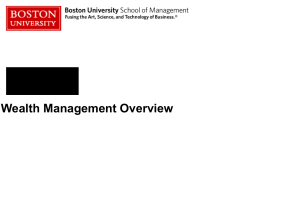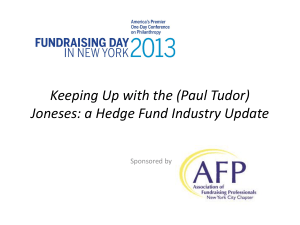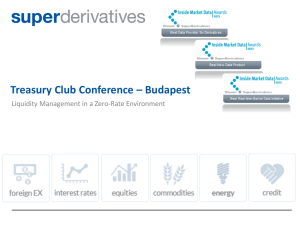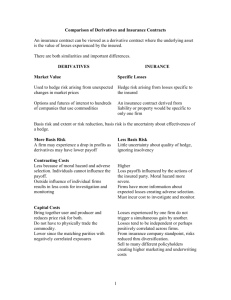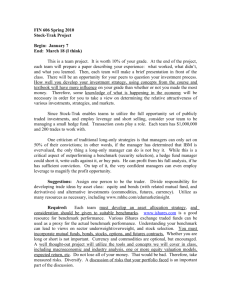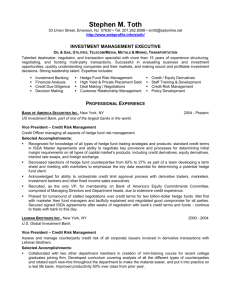THE TIPPING POINT - Canadian Investment Review
advertisement
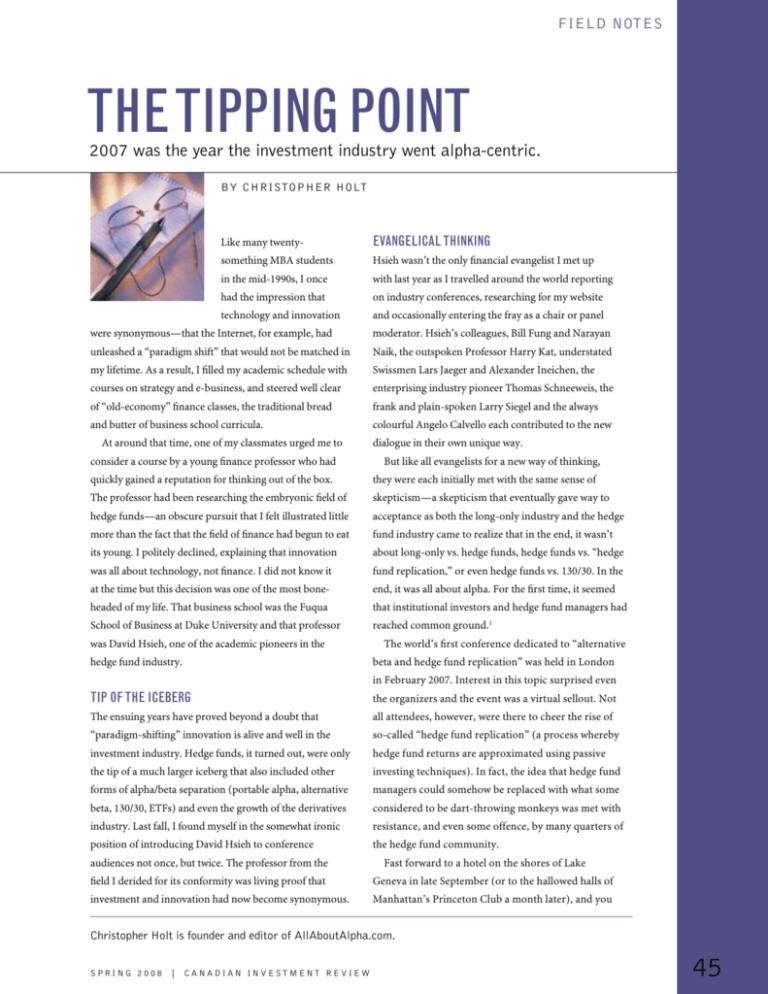
FIELD NOTES the tipping point 2007 was the year the investment industry went alpha-centric. b y C h risto p her h olt Like many twenty- Evangelical thinking something MBA students Hsieh wasn’t the only financial evangelist I met up in the mid-1990s, I once with last year as I travelled around the world reporting had the impression that on industry conferences, researching for my website technology and innovation and occasionally entering the fray as a chair or panel were synonymous—that the Internet, for example, had moderator. Hsieh’s colleagues, Bill Fung and Narayan unleashed a “paradigm shift” that would not be matched in Naik, the outspoken Professor Harry Kat, understated my lifetime. As a result, I filled my academic schedule with Swissmen Lars Jaeger and Alexander Ineichen, the courses on strategy and e-business, and steered well clear enterprising industry pioneer Thomas Schneeweis, the of “old-economy” finance classes, the traditional bread frank and plain-spoken Larry Siegel and the always and butter of business school curricula. colourful Angelo Calvello each contributed to the new At around that time, one of my classmates urged me to consider a course by a young finance professor who had dialogue in their own unique way. But like all evangelists for a new way of thinking, quickly gained a reputation for thinking out of the box. they were each initially met with the same sense of The professor had been researching the embryonic field of skepticism­—a skepticism that eventually gave way to hedge funds—an obscure pursuit that I felt illustrated little acceptance as both the long-only industry and the hedge more than the fact that the field of finance had begun to eat fund industry came to realize that in the end, it wasn’t its young. I politely declined, explaining that innovation about long-only vs. hedge funds, hedge funds vs. “hedge was all about technology, not finance. I did not know it fund replication,” or even hedge funds vs. 130/30. In the at the time but this decision was one of the most bone- end, it was all about alpha. For the first time, it seemed headed of my life. That business school was the Fuqua that institutional investors and hedge fund managers had School of Business at Duke University and that professor reached common ground.1 was David Hsieh, one of the academic pioneers in the hedge fund industry. The world’s first conference dedicated to “alternative beta and hedge fund replication” was held in London in February 2007. Interest in this topic surprised even Tip of the iceberg the organizers and the event was a virtual sellout. Not The ensuing years have proved beyond a doubt that all attendees, however, were there to cheer the rise of “paradigm-shifting” innovation is alive and well in the so-called “hedge fund replication” (a process whereby investment industry. Hedge funds, it turned out, were only hedge fund returns are approximated using passive the tip of a much larger iceberg that also included other investing techniques). In fact, the idea that hedge fund forms of alpha/beta separation (portable alpha, alternative managers could somehow be replaced with what some beta, 130/30, ETFs) and even the growth of the derivatives considered to be dart-throwing monkeys was met with industry. Last fall, I found myself in the somewhat ironic resistance, and even some offence, by many quarters of position of introducing David Hsieh to conference the hedge fund community. audiences not once, but twice. The professor from the Fast forward to a hotel on the shores of Lake field I derided for its conformity was living proof that Geneva in late September (or to the hallowed halls of investment and innovation had now become synonymous. Manhattan’s Princeton Club a month later), and you Christopher Holt is founder and editor of AllAboutAlpha.com. s p r in g 2 0 0 8 | C anadian I n v est m ent Re v ie w 45 FIELD NOTES In a very real sense, alpha-centric investing, like e-business, has ceased to be a separate and distinct strategy. Instead it has become a ubiquitous and integral part of modern portfolio management. would find that hedge fund managers had not only Even within the hedge fund and long-only industries, accepted the notion that their returns contained various there was discord last year over who was better able “alternative betas,” but that many of these managers to execute these strategies: fundamental managers or had actually launched their own hedge fund replication quantitative managers. In this contest, quantitative offerings. In fact, many funds of hedge funds now managers clearly won the face-off, but as 2007 came to a borrow from the lexicon of the hedge fund replicators close, fundamental managers were making a comeback. to illustrate how they aim to add value. In fact, some of Portable alpha, the topic that started it all several years these new techniques are now making their way into the ago took a backseat to the newer variants on the alpha/beta world of traditional risk management.2 theme (e.g. 130/30). Over the course of the year, it became The issue of 130/30 funds has been no less contentious. increasingly clear that “portable alpha,” like the term These funds appeared on the global investment agenda hedge fund itself, had become so over-used that it had lost only a couple of years ago and 2007 marked the coming much of its meaning. There were hedge funds that called out for the hybrid hedge fund long-only products. The themselves portable alpha, consultants’ methodologies question on everyone’s minds during 2007 was, “who called portable alpha, and hedge fund/ETF portfolios called is better suited to providing these products: hedge fund portable alpha. During the course of 2007, the original managers or traditional investment managers?” meaning of portable alpha (isolating active management and overlaying it onto a different benchmark) seemed to Who’s the best? give way to a more all-encompassing notion that one might As usual, bloggers were the first to weigh in. Several simply call alpha-centric investing. prominent current and former hedge fund managers deriding 130/30 funds as hedge funds in disguise, requiring Enabling a new paradigm skills that only a hedge fund manager could provide (e.g. In a very real sense, alpha-centric investing, like short-selling and managing leverage). Ergo, they argued, e-business, has ceased to be a separate and distinct hedge fund managers were best qualified to manage these strategy. Instead it has become a ubiquitous and funds. Yet traditional long-only managers soon began to integral part of modern portfolio management. Like the open up a sizable lead with many of the world’s largest Internet, portable alpha, alternative beta, and 130/30 are quantitative managers launching 130/30 funds. These technologies that will enable, but will almost certainly firms argued that only they had the risk management not define this new paradigm of investing. The year 2007 and fiduciary experience to provide such funds to an marked the point at which these technologies ceased to increasingly cautious institutional marketplace. be curiosities and were internalized by the global asset Hedge fund managers shot back that 130/30 was management community. They had begun to cross the nothing more than an exchange-traded fund (ETF) (the chasm between what the technology industry calls early “100”) and a de-leveraged market neutral fund (the adopters and the rest of us. “30/30”). When this debate was sparked at a conference in Boston featuring the unstoppable Harry Markowitz, I Maybe those business school courses on innovation and technology will come in handy after all… z asked him whether this was, in fact, an appropriate way to view these funds. With the enthusiasm of a man a quarter of his age, he referred me to a recent paper he had written on the role of mean-variance optimization in 130/30 portfolio construction. In it, he showed that the hedge Endnotes 1. Lett, Tristram and Holt, Christopher “Two Solitudes: Replication and short extension bridge the pension and hedge fund gap” Canadian Investment Review, Fall 2007. 2. Lett, Tristram, “Benchmark Hedging: Liberating Your Risk Budget,” Working Paper, forthcoming. fund managers may actually have to revisit this view. 46 s p r in g 2 0 0 8 | C anadian I n v est m ent Re v ie w

